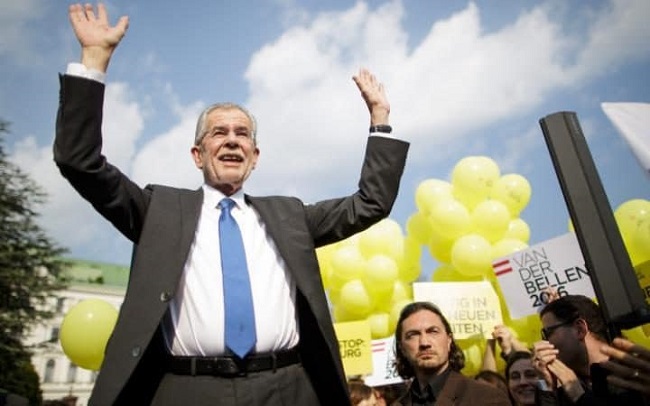
Photo: Alexander Van der Bellen
On December 4, 2016, Austrian Green Party candidate Alexander Van der Bellen was elected president against the far-right nationalist leader Norbert Hofer. The December 2016 vote took place against a background that has seen a steady rise of right-nationalist currents in much of Europe.
This current, often called “populist,” has played upon fears of migration to Europe of people from the Middle East and Africa, some fleeing the armed conflicts in Syria, Iraq, Libya, and Yemen, and immigrants from Africa moving in response to economic stagnation and environmental damage. Norbert Hofer and his rightwing Freedom Party developed their whole campaign on the fear of migrants, especially Islamic migrants. This same current of fear has been used in Hungary, the Netherlands, the Nordic countries, France and increasingly in Germany. The Brexit vote in the UK has also been widely interpreted as a victory of a nationalist-economically protectionist current.
For these reasons, many watched the Austrian election as a test of the strength of these nationalist-“populist” currents. The date of the Austrian vote was particularly important as a referendum took place the same day in Italy which led to the defeat and resignation of the Italian Prime Minister, Metteo Renzi, and the strong showing of the “populist”-regionalist Northern League, and the mixed-ideology “populist” Five Star Movement led by a former actor Beppe Grillo.
Austria’s President-Elect Van der Bellen, a retired economic professor of the University of Vienna, stressed the ability of Austria to accept refugees and migrants if there were strong cooperation between government administration and civil society organizations. He also stressed the importance of European Union economic policy and the need for broad economic cooperation. His win of 53 percent to 46 percent of the vote, much larger than in the previous May election, showed that many voters were willing to vote for reason rather than for fear.
Rene Wadlow is President of the Association of World Citizens.
